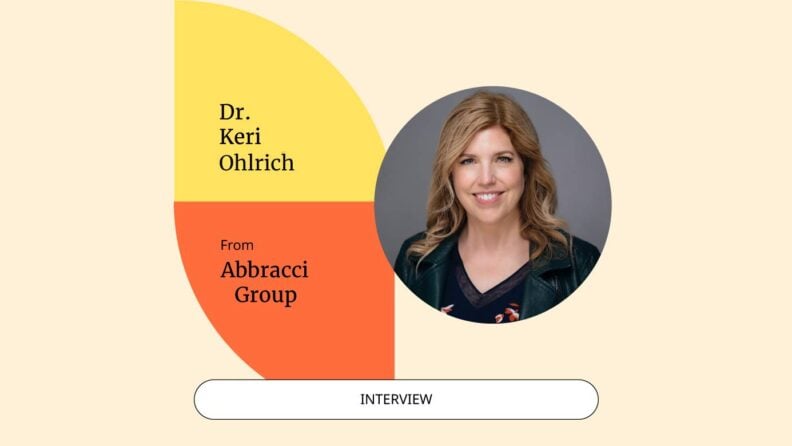Co-founder of Abbracci Group and the co-author of The Way of the HR Warrior, Dr. Keri Ohlrich continues her mission to share insights from 20+ years of experience in HR.
Keri co-hosts The Breakout podcast to get advice and insights from change experts, and dive into the stories of people who have busted out of life’s stifling boxes and shifted their lives into bold new territory.
Ohlrich's career includes leadership positions ranging from start-ups to Fortune 500 companies. Her professional roles have led to expertise in leadership and organization development, strategic talent planning and programs, defining and developing culture, change management, team building, employee development, engagement and retention and HR department diagnostics.
Tell us the story of how you got involved in HR/People Operations and leadership. How did your career lead you here?
My passion initially lay in the realm of psychology, with dreams of becoming a clinical psychologist. However, an opportunity presented itself in my hometown of Chicago in a HR Management program.
I found HR to be a place where I could make an impact on an individual level and an organizational level. In fact, I could perform subversive psychology! Eventually, I did obtain my PhD and coaching certification which provides me even more tools to help develop people and create organizations that are vibrant.
In which industries, verticals or sectors have you focused your career?
I entered the corporate arena at a Fortune 500 company, where I was part of a robust HR team comprising over 300 professionals. In this environment, I gained invaluable insights into the details of HR functions, learning effective HR practices and the art of navigating within a dispersed work structure.
My career led me through diverse sectors, mainly Fortune 500 companies including printing, consumer packaged goods, and staffing. Transitioning to consulting, I extended my expertise to a range of industries and organizations of varying sizes. For me, the industry does not matter, HR is agnostic, however, good leadership is the real key.
Why do so many companies struggle with making HR a priority? What are some common mistakes companies make?
The struggle in HR is real, and I could go on and on about it. But, let me just share a quick list of the why:
1) C-suite Leadership: Top of the list – leadership vibes. If the big shots in the C-suite aren't feeling the love for HR, we're pretty much stuck in first gear. No support, no progress – simple as that.
2) Budget Woes: Even when the higher-ups are on board, HR often gets the short end of the budget stick compared to other departments. We need tools, resources, and systems to work our magic, but sometimes the dollars are just not on our side.
3) HR Talent Hustle: If we don't have the right folks who can talk the talk and convince the C-suite about the importance of HR, we're kind of stuck. It's not always about HR being low on the priority list, sometimes it's just that we need the A-team to show how crucial we are.
You’ve been selected to give a keynote address at a major HR and leadership conference. What topic will you discuss and what major points will you touch on?
The Benefits of Laser Focused HR. The reality is, HR often finds itself juggling an overwhelming array of projects and responsibilities, with a tendency to say "yes" to everything that comes our way. While this eagerness to help is admirable, it can also be a fast track to HR burnout and a compromise in the quality of the programs we deliver, simply due to time constraints.
In my keynote, I would aim to explore strategies for HR professionals to hone in on their top priorities, effectively negotiate with the C-suite, and integrate self-care practices into their daily routines.
By focusing on the essentials and learning to say "no" to less critical initiatives, HR can ensure that their efforts are concentrated where they will have the greatest impact.
Have you seen, firsthand, any AI impacts on the practice of HR or people ops? What impacts are you expecting in the next few years?
I've witnessed firsthand the instant positive effects of assisting HR in crafting job descriptions, analyzing engagement survey responses, and drafting interview questions – essentially handling a ton of the admin tasks that tend to pile up.
What I'm really excited about is the prospect of AI stepping in to lend a hand in sifting through the enormous amounts of data we accumulate, spanning from onboarding to exit interviews.
With AI in the mix, we're talking about not just saving time but also valuable insights that can guide our strategies and decision-making. The potential is huge!
What skills have served you best in your career?
My problem-solving skills, creative mindset, curiosity about people's motivations, and a passion for brainstorming have been key contributors to my success.
In the pre-AI era, HR witnessed the outsourcing of various functions, such as payroll and benefits. However, what remains beyond the reach of simply outsourcing is the impact of creative problem-solving and the authentic connections with individuals. The ability to approach challenges with creative flair is an advantage that can't be replaced.
On a lighter note, in moments of heightened stress, my humor has proven instrumental in alleviating tension and lifting spirits. It can be a tool for fostering a positive atmosphere and creativity within the team.
What’s the best advice you’d give someone just starting out in their people operations career, or just starting to transition from a related discipline like HR or organizational development?
Well, my go-to advice is to snag a copy of my book, "The Way of the HR Warrior" – shameless plug, I know! Once that's covered, here's the real talk: If you're diving into HR because you simply love people and expect it to be a blast with hiring and engagement work, you might be in for a surprise.
I've had countless conversations with folks who initially stepped into HR with that "people person" vibe, only to discover that it involves some seriously challenging and, at times, gut-wrenching tasks.
The truth is, HR is not always sunshine and rainbows. However, if your passion lies in making a genuine impact, aiding people in their development, and crafting engaging environments for organizations, then HR could be right for you– but be prepared to bring a hefty dose of resiliency to the table. It's about finding fulfillment in the impactful work, even on the tough days, that makes the HR journey truly rewarding.
When did HR or people ops as a discipline pop up on your radar? How have you seen it evolve or change over that period of time?
I've witnessed a remarkable shift from the traditional Personnel model to the more holistic People, Culture, and Engagement departments within HR. We have evolved past the simple hiring and firing. Engaging in substantive discussions with leadership has earned HR its rightful place at the proverbial "table." Yet, it isn’t all rainbows as a persistent challenge remains– the enduring struggle for adequate budgets, respect, and resources.
What trend do you think will be most impactful in (your niche of) the people ops space over the next three years?
In my view, the most impactful lies in fostering cohesion among teams and cultivating effective collaboration. As we get deeper into the realm of AI tools, the key will be our capacity to innovate in tackling unique challenges.
The ability to coach individuals, facilitate organizational change adeptly, and analyze extensive data sets to distill actionable recommendations will undoubtedly yield the most significant impact.
What’s your biggest “hot take” or “least popular opinion” about an issue within the industry?
I said it already with my advice of not being in HR solely because “you like people”. Often this translates to “I want people to be happy and like me”, which in HR is not the case at all! In fact, quite the opposite, folks are nervous around you, say things like “oh no, HR is in the room.” Again, HR isn’t for the faint of heart!



